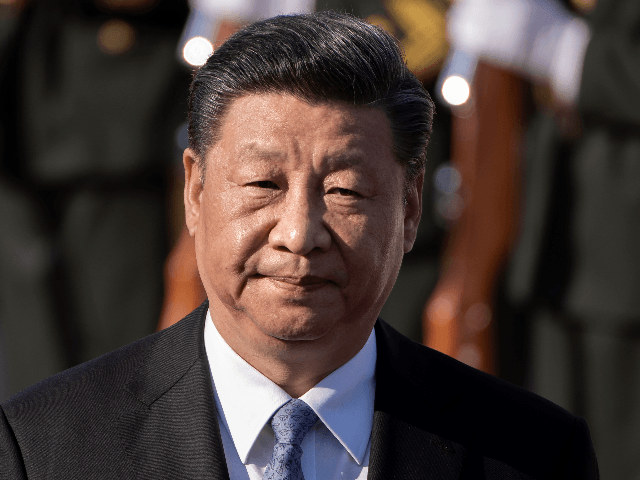China’s Global Times propaganda newspaper ran a column Tuesday arguing that the G7 group of economically developed nations no longer had a reason to exist, complaining that the group issued a mild statement of opposition to violence in Hong Kong.
Hong Kong has endured 12 weeks of democratic protests against China’s growing involvement in the nominally free society there. While violent incidents have occurred, they have largely been the product of police abuse of protesters or violent pro-China mobs attacking peaceful protesters.
China insists the protesters – who are demanding, among other things, the right to directly elect the lawmakers that decide how the city is run – are violent “rioters” who must be silenced to restore the “harmony” the city needs to strengthen China’s economy.
The Group of 7 nations consists of the world’s largest “developed” economies according to the International Monetary Fund (IMF). The IMF excludes China from the list, despite being the world’s second-largest economy, because China insists on being designated a “developing” country, which allows benefits in a variety of international forums meant to level the global financial playing field.
The Global Times primarily blamed President Donald Trump for the G7’s alleged uselessness, arguing that its member nations all put their “own interests first,” making “compromise and coordination … increasingly out of the question.” Every example mentioned of an end to compromise, however, was a situation in which America played a leading role: the limiting of Iran’s nuclear program through Trump’s rejection of the Iran Nuclear Deal; the ongoing, and increasingly successful, trade war with China; and Trump’s refusal to participate in international climate change agreements that would hurt the U.S. economy.
“It was quarrels among participating states over trade frictions, the Middle East situation and Russia that dominated much of the news, but settling the differences and solving problems were hardly seen,” the Global Times claimed. “President Trump even skipped the meeting on climate change – one of the major challenges facing the world.”
The Chinese government propaganda outlet quoted CNN’s Jim Sciutto referring to the summit as “a parade of lies” to make its point.
It also attempted to use the G7 statement on Hong Kong – which reports did not indicate was in any way controversial among G7 members – to claim that the summit was too fractured to produce results.
“Take the Hong Kong problem. The US tried hard to use Hong Kong as a bargaining chip in trade talks with China, and it is widely suspected that Washington has been manipulating Hong Kong riots behind the scenes,” the newspaper claimed, withholding the fact that only Beijing “widely suspects” the Hong Kong protests are not organic.
“But at the end of the summit, these troublemakers shed crocodile tears over the Chinese city’s misfortune, once again pointing fingers at China’s internal affairs,” the newspaper claimed. It did not elaborate over how the “crocodile tears” prove its main argument that the G7 summit is divided.
“From our perspective, there is no need for the leaders to bother with the next gathering’s location; simply calling it off might be a good option,” the publication concluded. “After all, except for attracting visitors to the host cities, the G7 summit has little to be praiseworthy.”
The G7 nations published a joint statement following the end of the meeting this week that included a tepid statement on the ongoing Hong Kong protests: “The G7 reaffirms the existence and importance of the Sino-British Joint Declaration of 1984 on Hong Kong and calls for violence to be avoided.”
The declaration in question and the subsequent “Basic Law” adopted upon China’s takeover of Hong Kong in 1997 impose the policy of “One Country, Two Systems” on Hong Kong. The policy requires Hong Kong not to seek independent sovereignty from China so long as the Chinese Communist Party does not impose its laws on the city.
The Chinese Foreign Ministry condemned the G7 for its statement on Tuesday.
“We deplore and firmly oppose such wanton comment in the G7 joint statement. As we’ve emphasized time and again, Hong Kong affairs are China’s internal affairs,” spokesman Geng Shuang told reporters. “No foreign governments, organizations or individuals have any right to interfere.””We will manage our own affairs properly. I would like to say this to the G7 members: no more meddling with ill intentions,” he insisted.
Hong Kong residents began taking to the streets in June in response to a proposed law that would allow Hong Kong police to extradite any individual China accused of breaking communist laws, essentially making Chinese law applicable in the autonomous region. The protesters contend that allowing Hong Kong police to punish individuals for allegedly breaking Chinese law is a violation of “One Country, Two Systems.”
The last weekend of protests was the most violent so far, marked by police officers firing their guns and using water cannons for the first time against protesters. Police action against protesters has also exacerbated the situation in the city, as people protest police behavior in addition to the extradition law.
The protest movement has put forward five demands to their government: a full withdrawal of the extradition bill, an independent inquiry on police brutality, freedom for political prisoners, a retraction of the “riot” designation for the protest on June 12, and direct election of lawmakers.

COMMENTS
Please let us know if you're having issues with commenting.